The Ultimate Guide to VPS Hosting in India: Features, Performance, and Cost
When it comes to hosting your website in India, Virtual Private Server (VPS) hosting offers a powerful and flexible solution. In this comprehensive guide, we will delve into the key features, performance aspects, and cost considerations of VPS hosting in India. By understanding these factors, you can make an informed decision and choose the right VPS hosting provider for your website.

Features of VPS Hosting in India
VPS hosting provides several features that make it an attractive option for businesses of all sizes. These features include:
1. Dedicated Resources
With VPS hosting, you get dedicated CPU, RAM, and storage resources, ensuring optimal performance and scalability.
2. Root Access
VPS hosting grants you root access to your virtual server, giving you complete control over software installations, configurations, and customizations.
3. Enhanced Security
VPS hosting provides a higher level of security compared to shared hosting, with isolated server environments and the ability to implement advanced security measures.
4. Scalability
VPS hosting allows you to easily scale your resources as your website grows, ensuring consistent performance and accommodating increased traffic.
Performance of VPS Hosting in India
Your website’s functionality is essential for both user experience and search engine rankings. Here are some performance aspects of VPS hosting:
1. Uptime and Reliability
Look for VPS hosting providers in India that offer high uptime guarantees and have a robust infrastructure with redundant systems and backup power sources.
2. Network Speed
Check if the hosting provider has multiple data centers located strategically in India to ensure low latency and fast network connectivity.
3. SSD Storage
Opt for VPS hosting plans that include Solid-State Drives (SSDs) for storage, as they offer faster data retrieval and improve overall website performance.
4. Server Configuration
Choose a VPS hosting provider that utilizes the latest server technologies, optimized software stack, and caching mechanisms to enhance website speed and responsiveness.

Cost Considerations for VPS Hosting in India
While VPS hosting offers numerous benefits, it’s essential to consider the cost factors. Here are some considerations:
1. Pricing Plans
Compare the pricing plans of different VPS hosting providers in India, taking into account the allocated resources, features, and scalability options.
2. Value for Money
Assess the features, performance, and customer support offered by the hosting provider to determine if the pricing is justified in terms of the value you receive.
3. Contract Terms
Check if the hosting provider offers flexible contract terms, such as monthly or yearly plans, and evaluate any discounts or promotional offers that may be available.
Conclusion
VPS hosting in India provides a robust and flexible hosting solution for websites of all sizes. By considering the features, performance aspects, and cost factors discussed in this guide, you can make an informed decision when choosing a VPS hosting provider.
Remember to assess your specific requirements, prioritize performance and reliability, and select a hosting plan that aligns with your budget and growth plans.
Frequently Asked Questions
Q1. Can I upgrade my VPS hosting plan if my website experiences increased traffic?
Yes, most VPS hosting providers in India offer scalability options that allow you to upgrade your resources as your website grows. Check with your provider to ensure they offer seamless upgrades without downtime.
Q2. Is technical expertise required to manage a VPS server in India?
While VPS hosting gives you more control, it may require some technical knowledge. However, many hosting providers offer managed VPS plans where they handle server maintenance and technical aspects, allowing you to focus on your website.
Q3. What type of customer support can I expect from VPS hosting providers in India?
VPS hosting providers typically offer 24/7 customer support through various channels like live chat, email, or phone. Ensure that the provider has a responsive and knowledgeable support team to assist you with any technical issues or inquiries.




